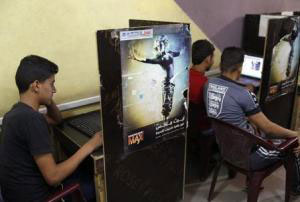DUBAI — Iraq's reliance on Kurdistan for Internet connectivity due to Baghdad bureaucracy has put the northern autonomous region in control of three-quarters of Iraqi networks.
This runs contrary to what Baghdad had sought from state control of fixed infrastructure within its jurisdiction, and the situation has spooked private investors and neutered Internet development outside Kurdistan, which sets its own rules.
Iraq bars private companies from owning fixed networks transiting domestic data and anything they build is usually seized by the government.
Just 9.2 per cent of Iraqis are online, according to the International Telecommunication Union, placing OPEC's second-largest crude exporter below the likes of Haiti and Nepal despite an average income six times greater.
In Iraq proper, a one megabyte per second broadband connection costs $399 per month, Arab Advisors Group estimates.
This compares with $3.51 in the European Union and $7 in Iran, according to Ookla consultancy, while Kurdistan's pro-business approach has made the region's Internet faster, cheaper, more reliable and widespread.
Dyn Research estimates Kurdish Internet Service Providers (ISPs) transit three-quarters of Iraq's networks and about 90 per cent of individual IP addresses on those networks.
"If Kurdistan and Iraq became adversarial, then it could definitely become an issue," said Doug Madory, Dyn research director of Internet analysis. "I can't think of another example where a larger country was so reliant on a smaller country or territory for access to the Internet."
Intercept
That could allow the Kurdistan Regional Government (KRG) to intercept Baghdad Internet traffic, but the region likely lacks the resources to intercept south-bound communications to an extent that would trouble Baghdad, Madory said.
"More importantly, it gives the KRG a chip to play in discussions with the government of Iraq," he said. "What can Iraq hold over the KRG in an attempt to enforce their policies when they are so dependent on the KRG for outside access?"
In April, Mohammed Noori, a senior official at the Ministry of Communications, acknowledged that greater private sector involvement in the sector could be beneficial, but highlighted security dangers.
"Maybe it will help in spreading and developing broadband services faster in Iraq but it will make another security issue for us," he said. "Our situation is so critical maybe now we cannot allow this, but maybe in the future."
Noori and the Ministry did not respond to repeated requests by Reuters for further comment, but state control appears at least as much a priority as security.
Erbil-based Newroz Telecom has the largest international Internet gateway in Iraq yet faces long-standing hostility from Baghdad, which often blocks the company transiting data into Iraq from Kurdistan, Ali Imad, Newroz technical director, said. Iraq allows it to carry traffic in the other direction.
Newroz had built 80 per cent of a fibre cable from Turkey to the Gulf via Kurdistan and Iraq, investing $137 million, before Baghdad halted work in 2012 citing security fears, said Imad.
Such a decision also reflects a generational gap between the Kurdish and Iraqi administrations, said Geoffrey Batt, a founding partner of New York hedge fund Euphrates Advisors.
"In Baghdad you have older generations in key positions," he said. "They don't think in modern economic terms, they still think of the state as being the centre of the economy."
Baghdad and the KRG may curb their differences as they unite against Islamic State — the two parties agreed this month to ease tensions on the separate issue of Kurdish oil exports — but their anti-militant alliance is unlikely to prove permanent due to mutual suspicions, analysts say.
State rules
State-run Iraqi Telecommunications and Post Company rents capacity on creaking government Internet networks, which ISPs complain is difficult and inefficient.
"The real losers are normal people who can't get decent services," said Martin Frank, chief executive of IQ Networks, a wholesale ISP based in the Kurdish city Sulaymaniyah.
Unusually, Iraq levies transit fees on Internet traffic.
"This makes it very expensive for service providers," said Frank. "They can't afford to buy much capacity so the bandwidth they give customers is very low."
About 90 per cent of traffic reaches end users in Iraq via wireless or microwave over congested, low-capacity frequencies, much of which is provided by unlicensed companies.
The Ministry's Noori said Iraq planned to roll out fibre-to-the-home (FTTH) broadband to all provinces.
"The problem is everything takes more time because of legacy managerial, administrative procedures," he said.
The government awarded contracts to build some FTTH but these mostly only reached the street, industry sources say. From there, another firm should have built a further fibre link to each home, but there was scant interest in doing so.
"We have many qualified, experienced technicians, but the Ministry didn't hire these people — they hire relatives, friends," said Hayder al-Sammarray, a telecom engineer. "For FTTH, it's like the government threw the money into the sea."
